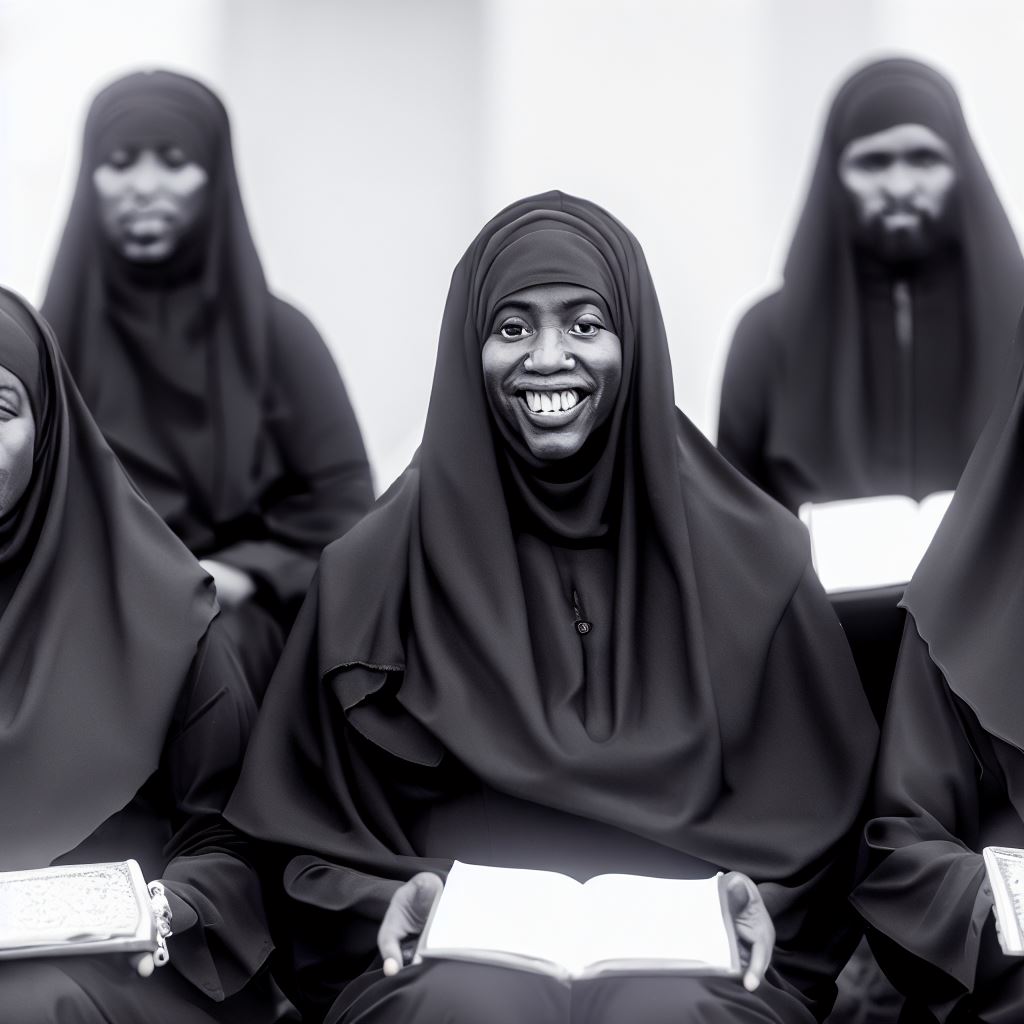Introduction
Women imams in Nigeria are female religious leaders who play significant roles in their communities. They lead prayer services, provide spiritual guidance, and educate others about Islamic teachings.
Understanding the Role of Women Imams in Nigeria and their impact on Society Women imams in Nigeria have a profound impact on society, promoting gender equality and empowering women.
A Brief Overview of Women Imams in Nigeria:
- Women imams, a growing presence in Nigeria, break gender norms in Islamic leadership.
- They lead prayers, teach, and provide spiritual guidance.
Thesis Statement:
Understanding the Role of Women Imams in Nigeria and Their Impact on Society:
- This chapter explores the emergence of women imams in Nigeria’s Islamic landscape.
- It delves into their roles, challenges, and contributions, shedding light on their transformative impact.
Historical Background
Overview of Islamic history in Nigeria
In Nigeria, Islam has a rich and complex history that dates back several centuries.
The arrival of Islam can be traced back to the 11th century, with the establishment of the Kanem-Bornu Empire in northeastern Nigeria.
However, it was during the 14th century that Islam began to spread widely across the region, thanks to the efforts of the renowned scholar and leader, Sheikh Usman dan Fodio.
Role of women in traditional Islamic societies
In traditional Islamic societies, women have played essential roles within the family and community.
While there has been a general perception of women’s subordinate status, Islam acknowledges the importance of women in society.
Women have been active as wives, mothers, educators, and caretakers, among other roles.
They have also participated in religious activities at the community level, particularly within the context of Islamic women’s organizations.
Emergence of women imams in Nigeria
The emergence of female imams in Nigeria is a relatively recent phenomenon.
Women imams, also known as Alhajas, play a significant role in leading and guiding female congregations in prayer and providing spiritual guidance.
This development can be attributed to a variety of factors, including the desire for gender equality within religious spaces, the influence of feminism, and the need to address the specific religious needs of women.
Understanding the historical background is essential to grasp the significance of women imams in Nigeria and their role in shaping Islamic practices and promoting gender equality within religious spaces.
Read: Historical Impact of Imams on Nigerian Society
The Position of Women in Islam
Women’s rights according to Islamic teachings
- In Islam, women have equal rights and are entitled to receive education and own property.
- Islamic teachings emphasize the importance of treating women with respect and providing them with justice.
- Women in Islam have the right to choose their own spouse, inherit wealth, and engage in business transactions.
- Contrary to popular belief, Islam does not restrict women’s freedom but rather empowers them.
Interpretations of women’s roles in different societies
- The interpretation of women’s roles in Islam varies across different cultures and societies.
- Some societies tend to be more conservative and restrict women’s participation in leadership roles.
- Other societies interpret Islamic teachings in a more progressive manner, allowing women to lead and make decisions.
- This variation in interpretation often leads to differing views on the role of women in religious leadership.
Challenges faced by women in religious leadership roles
- Women who aspire to become religious leaders face numerous challenges within their communities.
- Social norms and cultural expectations often limit women’s opportunities to pursue religious education.
- Prejudices and stereotypes surrounding women’s capabilities hinder their acceptance as religious leaders.
- Traditional viewpoints and male-dominated hierarchies within religious institutions can be major obstacles for women.
- Women imams in Nigeria, for example, face opposition and resistance from conservative groups.
- Overcoming these challenges requires significant efforts to change societal perceptions and attitudes.
In essence, understanding the role of women imams in Nigeria requires exploring the position of women in Islam, the interpretations of women’s roles in different societies, and the challenges faced by women in religious leadership roles.
Islamic teachings affirm women’s rights, but societal and cultural factors often influence the implementation of these rights.
Women aspiring to be religious leaders face obstacles due to prevailing norms, stereotypes, and resistance from conservative groups.
Addressing these challenges necessitates promoting gender equality, changing societal perceptions, and empowering women to take on leadership roles in religious contexts.
Read: A Day in the Life of a Nigerian Imam: Insight
Women Imams in Nigeria
Demographics of Women Imams in Nigeria
- The number of women imams in Nigeria is steadily increasing, reflecting changing societal norms.
- Women imams are present across various Nigerian regions, representing diverse ethnic and religious backgrounds.
- They come from different age groups, ranging from young women to older and experienced ones.
- Women imams are actively involved in both urban and rural communities, catering to the needs of their congregations.
Training and Qualifications of Women Imams
- Women imams undergo extensive training, which includes studying Islamic theology, jurisprudence, and Hadith.
- They also participate in spiritual development programs to enhance their knowledge and leadership skills.
- Women imams often seek guidance from male imams to further deepen their understanding of religious texts.
- Their qualifications are recognized by local religious authorities, allowing them to officiate religious ceremonies.
Communities and Mosques Where Women Imams Are Present
- In Nigeria, women imams are present in various communities, from urban centers to remote villages.
- They lead congregational prayers in mosques specifically designated for women.
- Some mosques have designated separate prayer spaces for women, where female imams lead prayers.
- Women imams also play a crucial role in educating and counseling women in matters related to Islam.
Challenges Faced by Women Imams in Nigeria
- Women imams face resistance and skepticism from some conservative factions within their communities.
- They often struggle to gain acceptance and recognition as legitimate religious leaders.
- Traditional gender roles and societal expectations limit the involvement of women in religious leadership roles.
- Lack of financial support and infrastructure hinder the growth and presence of women imams.
Advocacy for Women Imams in Nigeria
- Women’s rights organizations and progressive religious scholars advocate for the inclusion of women imams.
- They emphasize the importance of gender equality in religious spaces and promote women’s empowerment.
- Advocacy efforts aim to challenge patriarchal norms and cultural biases that restrict women’s access to religious leadership.
- Increased awareness and support from the broader community are crucial for the advancement of women imams in Nigeria.
In fact, women imams in Nigeria are gradually emerging as influential religious leaders, despite facing various challenges.
Their presence and contributions reflect the evolving landscape of women’s roles in society.
Through education, advocacy, and community support, their influence can continue to grow, fostering inclusivity and gender equality within religious spaces.
Read: Top Schools for Aspiring Imams in Nigeria
Roles and Responsibilities of Women Imams
Women Imams hold an important position within Nigerian society, taking on various roles and responsibilities that contribute to the well-being and empowerment of women and the community as a whole.
Leading prayers and delivering sermons
Women Imams in Nigeria play a crucial role in leading prayers and delivering sermons to their congregations.
Leading prayers and delivering sermons allow these Women Imams to connect with their congregation on a spiritual level.
They provide guidance, inspire their followers, and ensure the proper execution of religious rituals.
Teaching and mentoring women and children
These women take on the responsibility of teaching and mentoring women and children, ensuring their spiritual growth and education.
Their role extends beyond the mosque walls. Women Imams actively engage in teaching and mentoring women and children.
They focus on religious education, helping individuals deepen their understanding of faith and develop strong moral values.
Offering counseling and guidance to community members
Women Imams also provide counseling and guidance to community members, serving as a source of support and advice.
Additionally, Women Imams serve as counselors and advisors to community members. They are trusted confidants, offering support and guidance in times of need.
Their empathetic nature and extensive knowledge make them valuable sources of wisdom for those seeking counsel.
Advocacy for women’s rights and gender equality
One of the significant roles of these Women Imams is advocating for women’s rights and promoting gender equality in society.
Women Imams also take on the important task of advocating for women’s rights and promoting gender equality.
They challenge societal norms that limit women’s opportunities and fight against discrimination.
Their efforts often include raising awareness, organizing workshops, and collaborating with local organizations to drive positive change.
Promoting interfaith dialogue and tolerance
Women Imams actively engage in promoting interfaith dialogue and fostering tolerance among different religious communities.
Furthermore, Women Imams actively promote interfaith dialogue and tolerance.
Recognizing the religious diversity in Nigeria, they work towards fostering understanding and harmony among different faith communities.
By organizing interfaith events and participating in initiatives, Women Imams help build bridges and break down religious barriers.
In short, Women Imams in Nigeria have diverse responsibilities that go beyond leading prayers and delivering sermons.
They play a crucial role in teaching and mentoring, offering counseling and guidance, advocating for women’s rights, and promoting interfaith dialogue.
Their contributions are instrumental in shaping a more inclusive and tolerant society.
Read: Challenges Faced by Imams in Nigeria Today

Controversies Surrounding Women Imams
Despite the controversies, women imams continue to make strides in Nigeria’s Islamic community.
They are breaking barriers, challenging gender norms, and advocating for gender equality within religious spaces.
These controversies, although significant, should not overshadow the contributions and achievements of women imams.
Conservative views and opposition
- Women imams face opposition from conservative groups who argue that women leading prayers contradict religious customs and traditions.
- These groups believe that women should have limited roles within the religious community.
- However, these views clash with the growing movement for gender equality and inclusivity.
Reservations from traditional male imams
- The opposition to women imams is not limited to conservative groups.
- Traditional male imams also express reservations about women taking on leadership roles.
- They often feel threatened by the emergence of women in positions of authority within the religious hierarchy.
- The resistance from male imams reflects deeply ingrained patriarchal norms and power dynamics.
Criticisms and misconceptions about women imams
- Critics often misconstrue the role of women imams, accusing them of challenging Islamic principles and teachings.
- They claim that women imams deviate from established Quranic interpretations and are influenced by Western feminism.
- Additionally, some argue that women lack the physical strength and charisma necessary to effectively lead prayers.
- These controversies surrounding women imams highlight the need for open dialogue and understanding within religious communities.
- It is crucial to address misconceptions and challenge rigid gender roles.
- Women imams play a vital role in promoting inclusivity and empowering women within the Islamic faith.
In general, the controversies surrounding women imams in Nigeria stem from conservative views, opposition from traditional male imams, and criticisms based on misconceptions.
Despite these challenges, women imams continue to make significant contributions and advocate for gender equality.
It is essential to embrace their leadership and foster a more inclusive and progressive religious environment.
Society’s Response and Impact
Public perception and acceptance of women imams
- Society’s view of women imams varies, with some embracing their role and others strongly opposing it.
- Stereotypes and cultural norms often influence public perception of women imams in Nigeria.
- Women imams face criticism and resistance from conservative groups who view their role as against tradition.
- Progressive individuals and organizations support women imams, advocating for gender equality within religious institutions.
Empowerment and social upliftment of women
- Women imams provide an avenue for female empowerment in Nigerian Muslim communities.
- Through their leadership roles, women imams inspire other women to assert their rights and pursue their aspirations.
- Women imams often engage in community development projects, contributing to the growth of society.
- By promoting education and advocating for women’s rights, they uplift the social status of women within their communities.
Influence on gender dynamics within Muslim communities
- Women imams challenge traditional gender roles within Muslim communities, creating a shift in gender dynamics.
- Their presence encourages a more inclusive and equitable approach to religious practices.
- Women imams serve as role models, challenging stereotypes and inspiring young girls to dream big.
- Their leadership positions help break down barriers and pave the way for more opportunities for women in various fields.
In review, the role of women imams in Nigeria has elicited mixed responses from society.
While some view them as a positive force for change and empowerment, others adhere to conservative views that oppose their presence in religious leadership roles.
However, women imams continue to make significant contributions by promoting female empowerment, challenging traditional gender dynamics, and inspiring others in Nigerian Muslim communities.
Their resilience and dedication serve as a catalyst for progress and pave the way for a more inclusive and equitable society.
Success Stories and Transformative Experiences
Profiles of Prominent Women Imams in Nigeria
- Aisha Ismail – A trailblazing woman imam who established the first female-led mosque in Nigeria.
- Fatimah Aliyu – Known for her extensive knowledge of Islamic teachings and her inclusive approach to religion.
- Halima Ibrahim – A fierce advocate for women’s rights in Islamic spaces and a leader in promoting gender equality.
- Zainab Abdulazeez – Overcame societal barriers to become a respected religious leader, inspiring many others.
Inspiring Stories of Positive Impact on Individuals and Society
- Amina’s Story – Amina, a young girl, found solace in a women-led mosque, empowering her to pursue education and challenge gender norms.
- Fatima’s Journey – Fatima’s encounter with a women imam transformed her perception of women’s capability to lead religious services.
- Empowering the Marginalized – Women imams have created safe spaces for marginalized individuals, providing comfort, guidance, and empowerment.
- Fostering Community Development – Women imams have actively worked towards community development, addressing social issues and fostering unity.
Examples of Changed Perceptions and Attitudes towards Women in Religious Leadership
- Acceptance and Recognition – Society’s growing acceptance of women imams as spiritual leaders, challenging traditional gender roles.
- Breaking Stereotypes – Women imams have shattered stereotypes, proving that women are equally capable of guiding and imparting religious teachings.
- Increased Female Attendance – The presence of women imams has led to increased female attendance in mosques, fostering inclusivity and diversity.
- Positive Media Coverage – Media coverage highlighting the successes of women imams has created public awareness and challenged biases.
In a nutshell, the role of women imams in Nigeria has had a significant impact on individuals and society. The profiles of prominent women imams showcase their diverse contributions and accomplishments.
Inspiring stories highlight the positive impact of women-led mosques on individuals, fostering empowerment and challenging societal norms.
Moreover, changed perceptions and attitudes towards women in religious leadership signify a progressive shift in societal acceptance and recognition.
Women imams in Nigeria continue to transform communities, encourage gender equality, and foster inclusive religious spaces.
Conclusion
Women imams play a significant role in Nigeria, breaking gender barriers and empowering women in religious spaces.
They challenge traditional norms and promote inclusivity by leading prayers, offering guidance, and acting as role models for other women.
It is crucial to recognize the importance of diversity and inclusivity within religious institutions.
By embracing women imams, religious communities can foster a more inclusive and egalitarian environment, promoting gender equality and empowering women.
Lastly, a call to support and empower women imams for a more equitable society.
We must advocate for the recognition of women imams and ensure they have equal opportunities to lead and participate in religious activities.
Empowering women imams will break down barriers, challenge discrimination, and pave the way for a more just and inclusive society.
Women imams in Nigeria are catalysts for change in the male-dominated religious realm.
Their presence challenges societal norms, promotes inclusivity, and empowers women to take active roles in religious institutions.
Recognizing their significance and supporting their empowerment is crucial for achieving a more equitable society.




